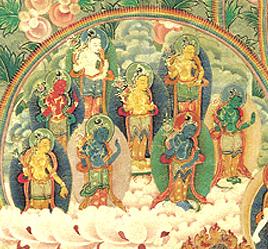Six paramitas

The six paramitas or 'transcendent perfections' (Skt. ṣaṭpāramitā; Tib. parol tu chinpa druk; Wyl. pha rol tu phyin pa drug) comprise the training of a bodhisattva, which is bodhichitta in action.
- Generosity (Skt. dāna; Tib. jinpa): to cultivate the attitude of generosity.
- Discipline (Skt. śīla; Tib. tsultrim): refraining from harm.
- Patience (Skt. kṣānti; Tib. zöpa): the ability not to be perturbed by anything.
- Diligence (Skt. vīrya; Tib. tsöndrü): to find joy in what is virtuous, positive or wholesome.
- Meditative concentration (Skt. dhyāna; Tib. samten): not to be distracted.
- Wisdom (Skt. prajñā; Tib. sherab): the perfect discrimination of phenomena, all knowable things.
The first five paramitas correspond to the accumulation of merit, and the sixth to the accumulation of wisdom.
Written Sources
Sutras
- Fortunate Aeon Sutra {See The Fortunate Aeon: How the Thousand Buddhas Became Enlightened (Berkeley: Dharma Publishing, 1986), Vol. One, pages 97-477.}
Shastras
The six paramitas are mentioned and explained in many of the most important Indian sources, such as
- Nagarjuna’s Letter to a Friend,
- Chandrakirti’s Introduction to the Middle Way and
- Shantideva’s Bodhicharyavatara.
Further Reading
- Geshe Sonam Rinchen, The Six Perfections, translated by Ruth Sonam (Ithaca: Snow Lion, 1998)
- Khenpo Ngawang Pelzang, A Guide to the Words of My Perfect Teacher (Boston & London: Shambhala, 2004), pages 181-219.
- Patrul Rinpoche, The Words of My Perfect Teacher (Boston: Shambhala, Revised edition, 1998), pages 234-261.